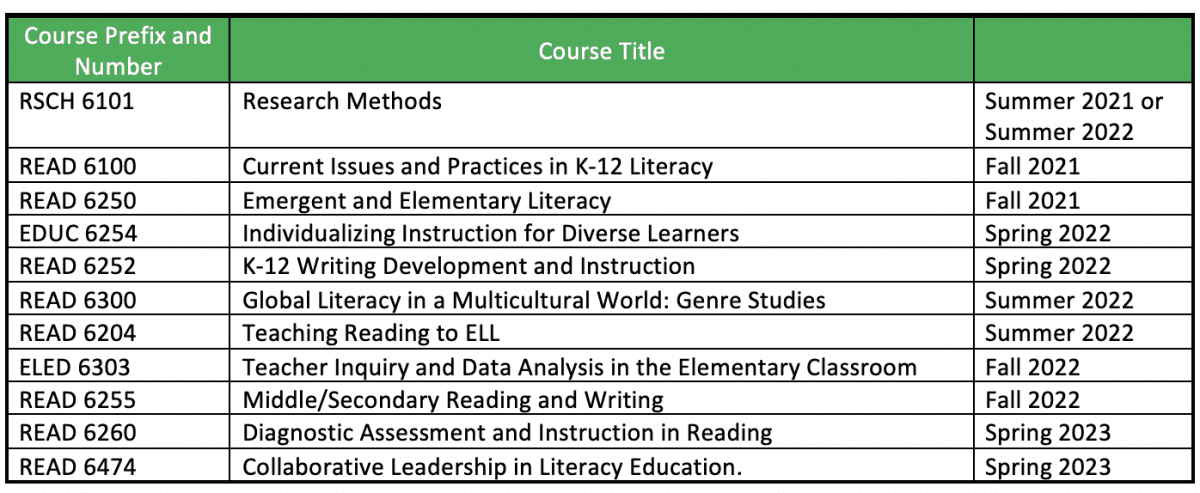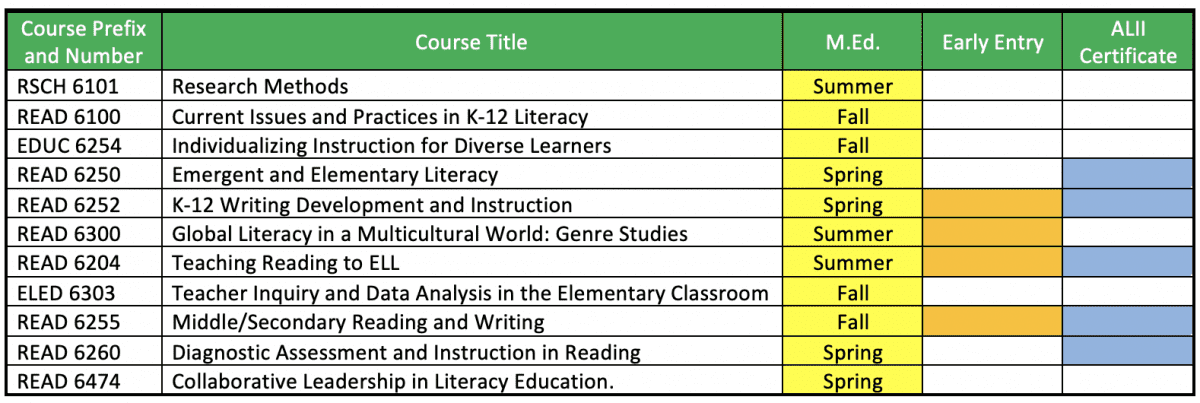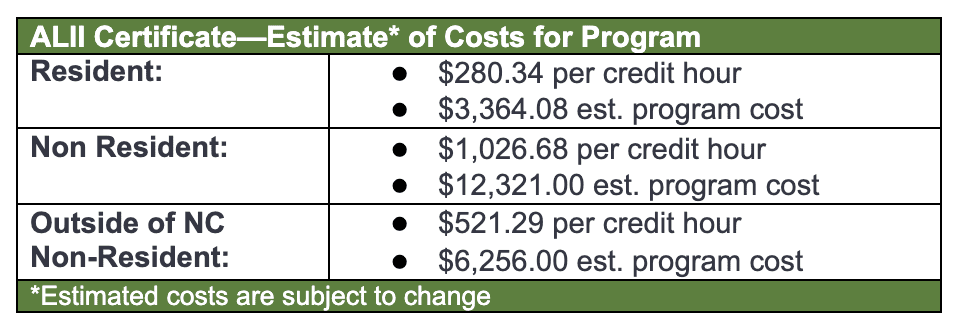Frequently Asked Questions – M.Ed. in Reading Education
Q: What are the admission requirements for the M.Ed. in Reading Education, ALII Certificate & Early Entry Programs?
Students applying for admission to the Graduate Reading Programs must have:
-
A bachelor’s degree, or its equivalent, from a regionally accredited college or university
-
GPA of at least 3.00 (based on a 4.0 scale) on all previous work completed beyond high school (secondary school).
-
An online application through the Graduate School’s application system for the M.Ed. in Reading (not required for the Certificate)
-
A statement of purpose
-
Transcripts of all college coursework attempted
-
Official and satisfactory scores on the Test of English as a Foreign Language (TOEFL) or the International English Language Testing System (IELTS), if English is not the applicant’s native language and he or she has not earned a post-secondary degree from a U.S. institution
-
Standardized test scores are NOT required for admission (e.g., GRE, GMAT, MAT). Test scores may be submitted as an option by applicants to provide additional information or supplement their application.
Applications for the M.Ed. in Reading Education Summer start are due by April 30 and applications for Fall start are due by Aug. 1 of that year.
Applications for the Early Entry and the Advanced Literacy Instruction & Intervention Certicate (ALII) are accepted any time for admissions Fall, Spring or Summer.
Q: What is the current course of study and typical timeline for students in the M.Ed. program?
The current course of study for students offers two start options: 1) Summer, or 2) Fall. Both offer a pathway to graduate in two years for students to follow. The difference between Summer and Fall start options is when you take RSCH 6101. Students can take that in the Summer prior to their first Fall term or in the second Summer with READ 6300 and READ 6204. We encourage students to take the Summer start option and take RSCH 6101 prior to their first Fall term. This lightens the courseload during the second Summer. Here is the sequence we envision for 2021-2022:

Q: What is the typical timeline for students in the ALII Certificate program?
Since students can apply for admission to the during any term (Fall, Spring, or Summer), the timeline may vary but for most students will complete the program in three semesters or terms.
Q: What graduate reading coureses in the M.Ed. in Reading overlap with the ALII Certificate and Early Entry programs.
The courses that students take for Early Entry and for the Advanced Literacy Instruction & Intervention Certificate all fall within the M.Ed. in Reading Education. The goal of early entry is for undergraduate students to take up to 12 hours of graduate reading (M.Ed.) courses while they are undergraduates and then complete the M.Ed. following completion of their B.A. The ALII Certificate is a stand-alone graduate certificate with courses from the M.Ed. in Reading. Students in the Certificate take four of five designated courses. Here is a link to the catalog course descriptions of these courses; the chart below provides a snapshot of these connections:

Q: Can applicants take any coursework prior to being admitted into the program?
Yes, candidates can complete enroll in up to six hours as a Post-Baccalaureate student or with departmental permission (if transferring from a different program).
Q: Can applicants transfer courses from another university into the program?
Yes, candidates can transfer up to six (6) credit hours with approval from the university to the M.Ed. in Reading Education program.
Q: Is the coursework in-person or online?
The M.Ed. in Reading and the Advanced Literacy Instruction & Intervention Certificate are both fully online. Courses are delivered in the Canvas learning management system with some instructors also using video meetings through platforms like Zoom.
Q. What prerequisites regarding degrees and experience are necessary for admission to the program?
Applicants to the M.Ed. and ALII Certificate programs must have a bachelor’s degree from a regionally-accredited university. Candidates are not required to have teaching experience, although teaching or work with K-12 students in literacy is recommended.
Q. Does completion of the M.Ed. in Reading lead to initial or additional teaching licenses?
The M.Ed. in Reading Education program qualifies graduates who hold a North Carolina professional educator’s license for an advanced North Carolina K-12 Reading Education license at the master’s level. Graduates from the program who do not have a professional educator’s license can earn the M.Ed. in Reading degree but will not be eligible for licensure at any level.
Q: What kinds of positions do graduates of the M.Ed. in Reading Education Program take?
For graduates who are already teaching, some go move into teacher leader roles such as grade-level lead teachers or subject area chairperson while others become Reading Specialists or Literacy Coaches who work with teachers to improve literacy instruction through coaching, modeling, co-teaching and leading professional development. Some literacy specialists work with students in pull-out groups to support their literacy advancement. We now accept students who are not classroom teachers and do not have an initial teaching license and for those outside of the school setting there is a range of possibilities including tutoring and working with non-profits that serve children through out-of-school programs during the summer or after-school.
Q: What are the estimated costs for the M.Ed. in Reading Education and ALII Certificate?
Below are estimated costs for the 33-hour M.Ed. in Reading Education program (left) and the 12-hour Advanced Literacy Instruction & Intervention Certificate (right). For more information about tuition and fees please visit NinerCentral. Tuition rates vary based on residency. Residency for tuition purposes is decided by the North Carolina Residency Determination Service (RDS).
 |
 |
For more information
Contact Dr. Bruce Taylor, Program Coordinator, at bruce.taylor@uncc.edu